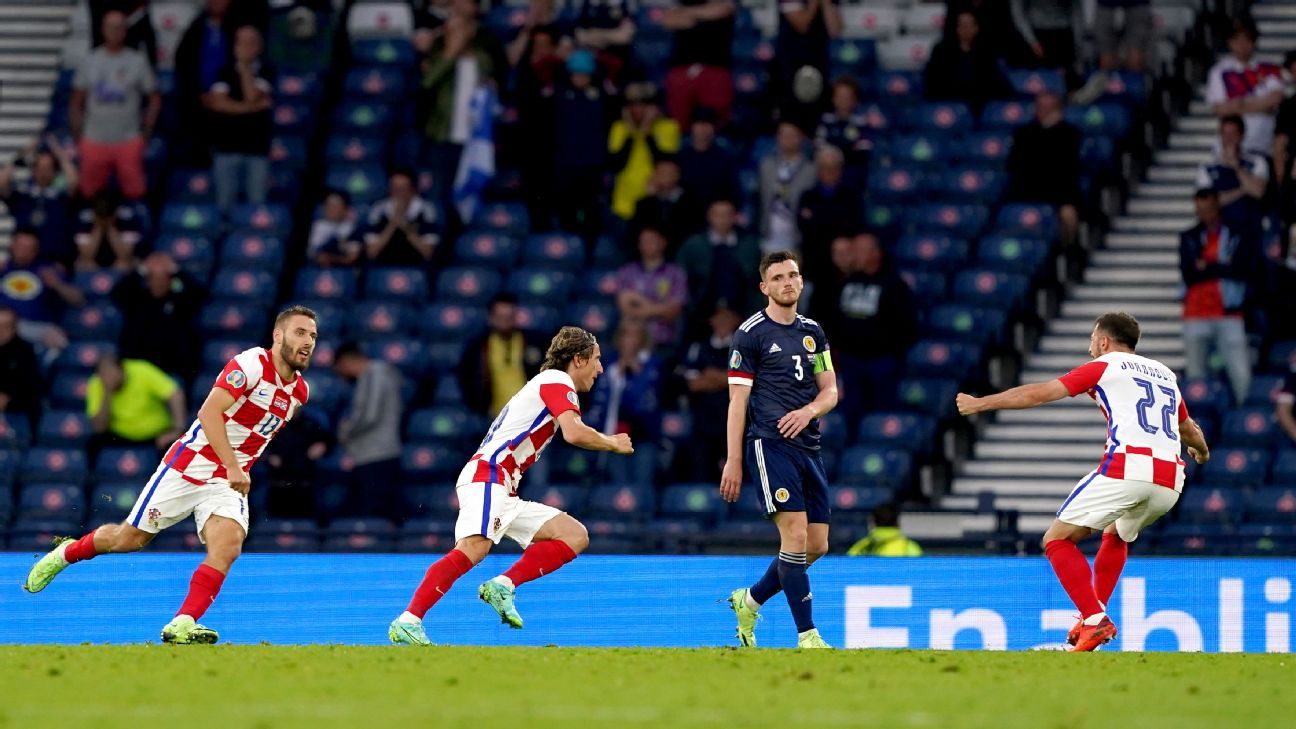GLASGOW, Scotland — They came to Hampden Park hoping for a night to remember, but in the end, Scotland’s success-starved supporters had to make do with a goal they will never forget. Croatia’s 3-1 victory in Glasgow secured the 2018 World Cup finalists qualification for the round of 16, but it was Luka Modric‘s stunning second-half strike that ended Scottish dreams of an end to their perennial tournament misery.
In 10 previous appearances at a major finals, either the World Cup or European Championship, Scotland were unable to progress beyond the group stage. Indeed, their dubious distinction of eight failures to reach the knockout stages at the World Cup remains a record — and they haven’t appeared at any World Cup since 1998.
But this time was supposed to be different. Steve Clarke’s team, having ended Scotland’s 23-year wait to appear at a major tournament, faced Croatia knowing that a win on home turf would finally end their long wait. Friday’s 0-0 draw against England at Wembley had enabled the Scots to approach this game with glory close enough to touch.
And as the Scottish fans — known as the Tartan Army — disembarked the trains for Hampden at Mount Florida Station, there was a tangible sense that they really felt that this was their time.
– Euro 2020 on ESPN: Stream LIVE games and replays (U.S. only)
– European Soccer Pick ‘Em: Compete to win $10,000
– Euro 2020 bracket and fixture schedule
But along came Modric, Croatia’s 35-year-old maestro, to kill the party atmosphere. His 62nd-minute goal, a majestic shot from 20 yards with the outside of his right foot, made it 2-1 to Croatia and left Scotland with the virtually impossible task of scoring twice in less than half an hour to win the game. It also saw him become Croatia’s oldest scorer at the Euros, 13 years after becoming their youngest, with a goal against Austria at Euro 2008.
“That’s what you’re up against at this level,” Scotland’s Callum McGregor said of Modric’s goal. “It was a tough lesson.”
McGregor’s 42nd-minute goal for Scotland, which cancelled out Nikola Vlasic 17th-minute opener, gave the Scots hope of a second-half surge to victory. It also raised the decibel levels in a stadium restricted to just 12,000 supporters due to COVID-19 regulations.
Scotland, without Chelsea midfielder Billy Gilmour due to a positive COVID-19 test, were direct, unashamedly targeting strikers Lyndon Dykes and Che Adams with long balls. They were energetic and prepared to match the streetwise Croatians in a physical battle.
But their inability to control possession was always going to be a problem against team as wily and experienced as Croatia. In many ways, Scotland allowed Zlatko Dalic’s team to pass them into submission, just as they did to England in the 2018 World Cup semifinal, when Modric was once again the conductor and controller of the ball.
Modric embellished his performance further by crossing for Ivan Perisic to head in Croatia’s third in the 77th minute to seal the win that confirmed second spot in Group D behind England.
Croatia are a quality team. Yes, they are a side stacked with ageing players who are perhaps playing in their last major tournament, but the likes of Modric, Perisic and Marcelo Brozovic can hurt any side, and the defensive partnership of Dejan Lovren and Domagoj Vida is rugged and determined enough to fight tooth and nail against any opponent. No team will be happy to face Croatia in the knockout stages. They know how to win and were perhaps the worst team for Scotland to face due to their ability to control a game.
“We came up against an excellent team,” said Scotland midfielder John McGinn. “And they have experience at the major tournaments and they showed that tonight.”
But Croatia’s quality will be no consolation to the Scots, who have seen the likes of Wales, Northern Ireland, Republic of Ireland and even minnows such as Iceland progress beyond the group stages of major tournaments, sometimes at the first attempt. Greece even managed to win one.
It is now 11 tournaments and counting for Scotland, and who knows when they will even get the opportunity to have another shot at getting beyond a group? Having failed to reach a World Cup this century, don’t bank on them playing in Qatar next year.
The agony of the Scots is that there have been so many near misses and this, by virtue of the fact they only had to win a home game, was another one.
On four occasions, they have been denied qualification by goal difference. In 1974, when the squad released a tournament song called “Easy, Easy,” Scotland became the first team to exit a World Cup without losing a game — but they still couldn’t escape their group. Four years later, coach Ally MacLeod boasted that his Scotland side would win the World Cup in Argentina, but after a draw against Iran and a defeat to Peru, they were on the first flight home once again. And at Euro 96, Scotland were 12 minutes from qualifying from their group, only for a 78th-minute goal by Patrick Kluivert in the Netherlands’ 4-1 defeat against England to enable the Dutch to deny the Scots on goal difference.
Against Croatia, the supporters made enough noise to drive Scotland to victory, but the game was decided on the pitch rather than in the stands. It was clear from the early stages that there was only going to be one winner.
If Scotland had Modric in their team, they would probably have made it through. But Modric is Croatia’s magician and Scotland can only hope to find one of their own in time for their next attempt at escaping a group at a major tournament.
